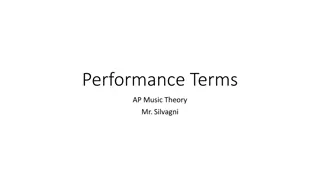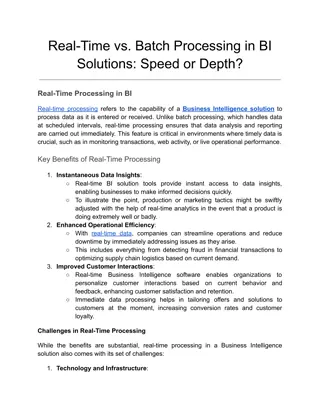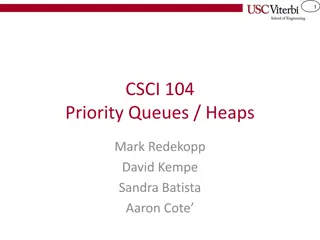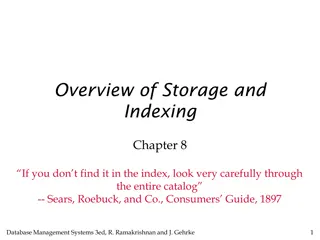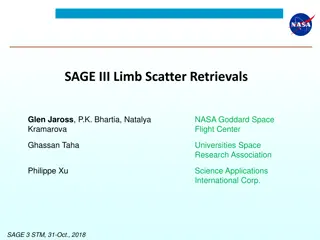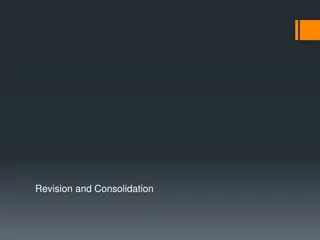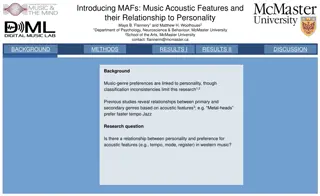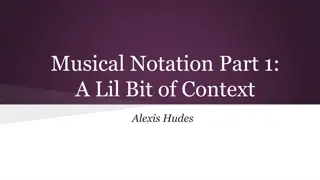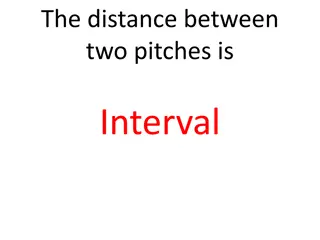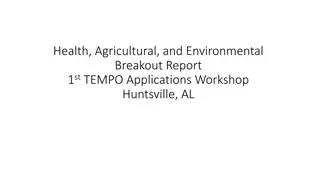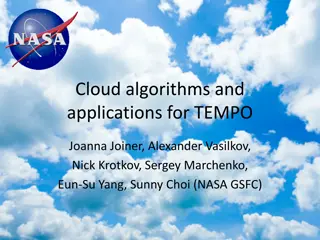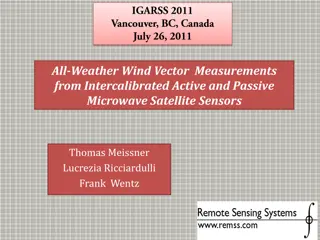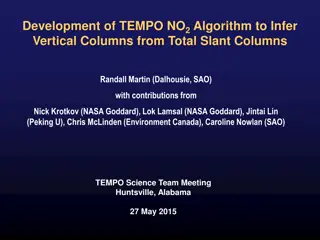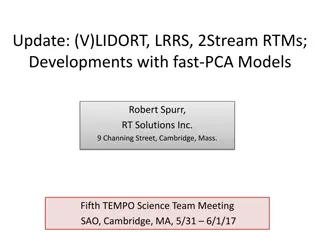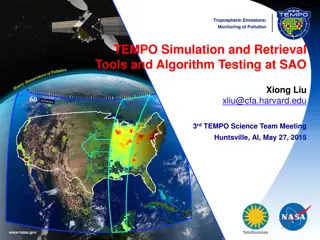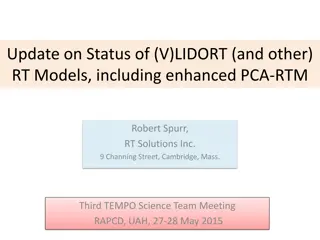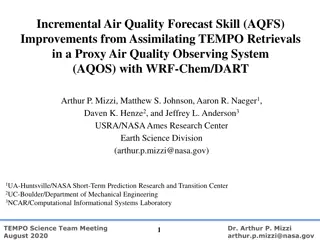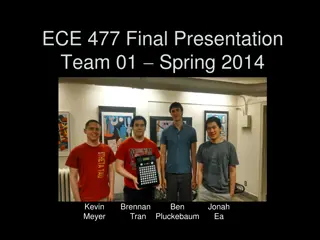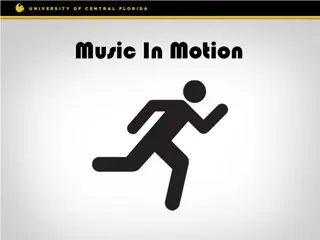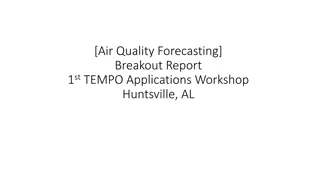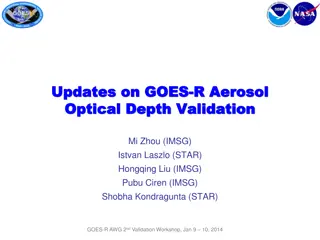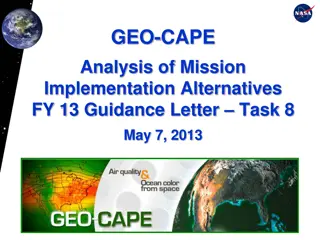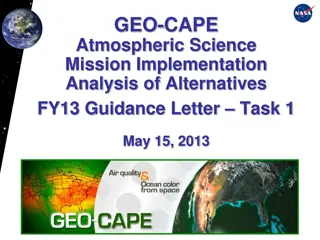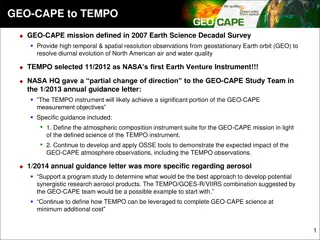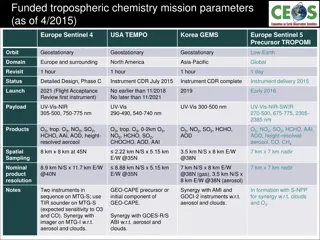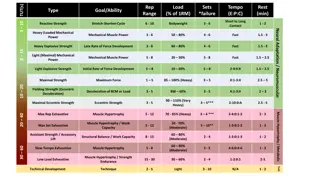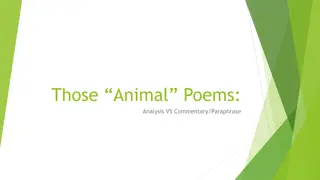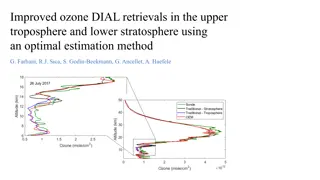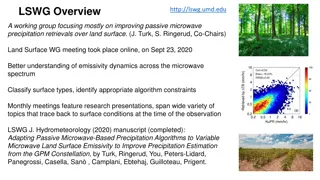NASA Earth Applied Sciences Program Updates and NRT Data Products
NASA's Earth Applied Sciences Program updates include discussions on NRT data products and user needs from health and air quality programs. Updates on NISAR, TEMPO, SBG, AOS, and LANCE are highlighted, focusing on real-time data products for monitoring various atmospheric parameters. Future near rea
6 views • 28 slides
Analysis of "I Know Where I've Been" from Hairspray
The analysis delves into key musical features of the song "I Know Where I've Been" from Hairspray, focusing on elements such as style, melody, harmony, rhythm, tempo, texture, structure/form, timbre, and dynamics. It discusses the song's chord progressions, vocal techniques, use of unison, crescendo
1 views • 13 slides
NEW MILFORD GREEN WAVE BASEBALL
Meet the standout baseball players from the senior class of 2020 at New Milford Green Wave. Players like Nick Bon Tempo, Jack Hayes, Jake Martinez, Ben Matthews, Colin Murphy, Luke Pliego, Nick Ruffler, and Max Sarich share their highlights and future plans as they graduate and move on to college. F
2 views • 13 slides
Essential Music Theory Terms and Concepts by Mr. Silvagni
Explore key music theory terms and concepts explained by Mr. Silvagni. Delve into Italian heritage in music terminology, clarifying terms, dynamics, tempo, and Italian tempo terms. Enhance your understanding of performance terms crucial for mastering music theory.
1 views • 16 slides
Real-Time vs. Batch Processing in BI Solutions_ Speed or Depth_
Dive into the dynamic world of BI processing where every second counts and every detail matters. This insightful blog navigates the crucial choice between real-time and batch processing, unraveling the trade-offs of speed and depth in data analysis. Discover how each approach can fuel your strategic
1 views • 7 slides
First Retrievals of Methane Isotopologue CH3D in High Arctic - EUREKA Workshop
Atmospheric methane, a key anthropogenic greenhouse gas, has seen a significant increase since pre-industrial times. The study focuses on retrieving the isotopologue CH3D from ground-based FTIR observations in the high Arctic, using specialized instrumentation and datasets. The research aims to unra
0 views • 16 slides
Priority Queues and Heaps in Data Structures
Priority queues prioritize item retrieval based on value, contrasting with traditional queues that follow a first-in-first-out approach. Priority queues efficiently manage items based on their importance, often utilized in scenarios like emergency rooms or air traffic control. Heaps, a form of binar
0 views • 20 slides
Storage and Indexing Overview in Database Management Systems
The chapter on storage and indexing covers various aspects such as data retrieval from external storage disks and tapes, file organizations like heap files and sorted files, as well as the importance and structure of indexes in speeding up data retrievals. It delves into B+ Tree indexes and their or
1 views • 33 slides
The Power of Music in Film: An Exploration of Ramin Djawadi's Cinematic Soundscapes
Delve into the captivating world of film scoring with a focus on Ramin Djawadi's iconic compositions for various TV shows, including Game of Thrones. Discover how music acts as a reliable narrator, shaping emotions, character development, and tension within cinematic productions. Explore the key ele
0 views • 7 slides
Advanced Analysis of SAGE III Limb Scatter Retrievals
The proposed effort focuses on enhancing LaRC operational retrieval codes for SAGE LS data, correcting Level 1 radiances, and recommending LS operational scenarios. OMPS LS retrieval algorithms for aerosol and ozone, as well as the SAGE/M3 LS ozone retrieval approach, are detailed. Out-of-field stra
0 views • 12 slides
Database Deployment Automation for IMS Interfaces
Automate your database deployments for IMS interfaces within the scope of various systems and interfaces including Wells Fargo, SUNTAX, transport scanners, KODAK, Fujitsu, FDLE, CAMS, DBPR, and more. This includes interfaces to GTA, CAMS, Wells Fargo, Florida Department of Law Enforcement (FDLE), an
0 views • 9 slides
Exam Style Music Revision: Tonality, Rhythm, Speed, and More
Dive into exam-style music revision covering topics such as tonality, key signatures, rhythm/tempo, speed changes, and various musical elements. From major/minor tonality to dynamic markings and instrument descriptions, enhance your music knowledge through this comprehensive guide.
0 views • 41 slides
Investigating Relationship Between Personality and Music Acoustic Features
This research by Maya B. Flannery and Matthew H. Woolhouse explores the connection between personality and music genre preferences based on acoustic features in Western music. The study involved undergraduate students and analyzed factors like tempo, mode, register, and their impact on individual pr
0 views • 5 slides
Evolution of Musical Notation Systems and Contexts
Explore the diverse world of musical notation systems, from Eastern to Western traditions, spanning Babylonian notations, Guido d'Arezzo's contributions, Gregorian chants, and modern-day tempo measures. Uncover the rich history and nuances of musical expression through various scales, staves, orname
0 views • 12 slides
Insights into UV/VIS Backscattered Sun Light Retrievals from Space-Born Platforms
Explore the history, instruments, and future of UV/VIS backscatter spectrometers, including a comparison of TOMS and OMI systems, the GEO constellation, and examples of data retrievals. Dive into the discovery of the ozone hole and the advancements in atmospheric chemistry analysis by USA, Europe, a
0 views • 41 slides
Essential Music Terminology Explained
Learn about key music terms such as Pitch, Dynamics, Tempo, Composer, and more in this comprehensive guide. Understand concepts like Interval, Crescendo, Diction, and how they contribute to the world of music. Explore elements like Bar Line, Arranger, Phrases, and the different vocal parts like Alto
0 views • 35 slides
Musical Insights: "The Little Sandman" by Johannes Brahms
Explore the musical richness of "The Little Sandman" by Johannes Brahms through its art song composition, tonality, mood, tempo, and melodic features. Uncover the soothing and gentle qualities of this piece in G major, with a melodic range of a 9th and the use of slurs for smooth articulation. Disco
0 views • 20 slides
Report on Health, Agricultural, and Environmental Breakout at 1st TEMPO Applications Workshop
This report highlights the potential applications of TEMPO data for addressing gas phase pollutants like NO2, SO2, and O3 impacting human health and agriculture. It discusses the need for improved spatial coverage and data latency, as well as potential collaborations with key partners like CDC, USDA
0 views • 7 slides
Music: Elements and Characteristics Explained
Explore the diverse elements that make up music, from melody and articulation to dynamics, time/tempo, structure, harmony, and instruments. Learn about the nuances of each aspect, including melody registers, articulation techniques, dynamic variations, tempo changes, structural formats, harmonic pri
0 views • 10 slides
Managing Changes and Substitutions in Team Sports
Efficiently managing changes and substitutions is crucial in team sports. The plate umpire holds the responsibility for recording changes, including positional adjustments, player substitutions, re-entry, and DP/FLEX in softball games. Clear communication between the umpire, coach, and statistician
0 views • 19 slides
Cloud Algorithms and Applications for TEMPO by Joanna Joiner et al.
Explore the cloud algorithms and applications for TEMPO, including the default baseline algorithm, OMI rotational-Raman algorithm, and other options like O2-O2. Learn about the validation with CloudSat, O2-O2 intercomparisons, and the implementation of tall poles for CLDRR applied to TEMPO. Discover
0 views • 9 slides
Analysis of All-Weather Wind Vector Measurements from Satellite Sensors
This study compares passive (radiometer) and active (scatterometer) microwave satellite sensors in measuring all-weather wind vector speeds. Challenges such as high wind speeds and wind speeds in rain are discussed along with the crucial role of the Ocean Surface Emissivity Model in the retrieval al
0 views • 22 slides
Developments in Vertical Columns Inference for TEMPO NO2 Algorithm
The development of the TEMPO NO2 algorithm to infer vertical columns from total slant columns involves contributions from various experts, such as Randall Martin, Nick Krotkov, Lok Lamsal, Jintai Lin, Chris McLinden, and Caroline Nowlan. Attention is needed for the removal of stratospheric NO2 and a
2 views • 10 slides
Developments in LIDORT and VLIDORT Models: Update and Upgrades
Overview of recent developments in LIDORT, VLIDORT, and related RT models including upgrades to versions 3.8/3.8, enhancements in optical property inputs, new water-leaving radiance treatment, improved BRDF options, and performance enhancements. Upgrades also include the release of LIDORT-RRS versio
0 views • 7 slides
TEMPO Simulation and Retrieval Tools Testing at SAO
TEMPO Simulation and Retrieval Tools and Algorithm Testing at SAO involved performing retrieval sensitivity studies, adapting VLIDORT for TEMPO radiance spectra, utilizing TEMPO SNR model for optical transmission calculations, and using climatological a priori data for trace gases. The studies focus
0 views • 4 slides
Overview of V*LIDORT and Other Radiative Transfer Models by Robert Spurr
The presentation provides an update on the status of V*LIDORT and other radiative transfer models as discussed at the Third TEMPO Science Team Meeting. It covers the LIDORT family overview, upgrades to the codes, new releases for RT models, and accelerated RT developments using PCA. The V*LIDORT cod
0 views • 12 slides
Enhancing Air Quality Forecasting with TEMPO Retrievals in Proxy Observing System
Improvements in Air Quality Forecast Skill (AQFS) are explored by assimilating TEMPO retrievals in a Proxy Air Quality Observing System (AQOS) using WRF-Chem/DART. The study focuses on benefits identified through a designed OSSE scenario, including application to the Front Range Air Pollution and Ph
0 views • 8 slides
ECE 477 Final Presentation Team 01 Spring 2014 Project Summary
In the ECE 477 Final Presentation for Team 01 in Spring 2014, the project involved creating a configurable melody generator with LED pushbutton grid, adjustable volume, and tempo settings. The team members, Kevin Meyer, Ben Pluckebaum, Brennan Tran, and Jonah Ea, worked on different aspects from des
0 views • 12 slides
Music in Motion: Innovative Running Device for Synchronized Music Experience
Music in Motion is a cutting-edge running device that generates music synchronized to your exercise, matching your run tempo. With a digital control system, it syncs music to your footfalls and tracks milestones via an Android application. Project aims include biofeedback music control systems and a
0 views • 35 slides
Insights into Air Quality Forecasting Breakout Report from TEMPO Applications Workshop
The breakout report from the TEMPO Applications Workshop in Huntsville, AL highlights the potential of TEMPO data in improving air quality forecasting. It discusses the measurement of ozone precursors, ozone, and PM2.5 on an hourly scale, emphasizing the value of high spatial and temporal resolution
0 views • 8 slides
Updates on GOES-R Aerosol Optical Depth Validation Activities
Generated proxy data algorithm enhancements for post-launch validation activities were discussed at the GOES-R AWG 2nd Validation Workshop in January 2014. The use of MODIS reflectances as a proxy for ABI to retrieve Aerosol Optical Depth (AOD) was emphasized, along with the importance of AERONET gr
0 views • 25 slides
Overview of GEO-CAPE Mission Implementation Analysis
The GEO-CAPE mission implementation analysis for FY 13 involved assessing instrument and mission risks, focusing on the impact of the TEMPO instrument on atmospheric science capabilities. Recommendations were made to update the instrument suite to align with evolving requirements. Risks were categor
0 views • 5 slides
Analysis of GEO-CAPE Atmospheric Science Mission Alternatives
The Geostationary Coastal and Air Pollution Events (GEO-CAPE) mission aims to measure atmospheric composition and ocean color. The impact of the Tropospheric Emissions Monitoring of Pollution (TEMPO) instrument on GEO-CAPE planning is acknowledged, with a need to adjust GEO-CAPE activities. An analy
0 views • 20 slides
Evolution of GEO-CAPE: Leveraging TEMPO for Atmospheric Observations
The GEO-CAPE mission, defined in the Earth Science Decadal Survey of 2007, aims to provide high-resolution observations from geostationary Earth orbit to monitor North American air and water quality. NASA's TEMPO instrument, selected in November 2012, plays a crucial role in achieving GEO-CAPE's obj
0 views • 5 slides
Funded Tropospheric Chemistry Mission Parameters Overview
Funded tropospheric chemistry missions like Europe Sentinel 4, USA TEMPO, Korea GEMS, and others aim to monitor atmospheric composition for air quality assessment. The missions involve advanced instruments to measure ozone, nitrogen dioxide, sulfur dioxide, aerosols, and more, with specific spatial
0 views • 9 slides
Strength Training Guidelines and Performance Metrics
Explore a comprehensive guide to strength training, covering rep ranges, load percentages, tempo, rest intervals, and various strength development goals. Additionally, discover insights into bar velocities, pound-for-pound equations, peak power formulas, and strategies for maximizing repetitions.
0 views • 18 slides
Analysis and Commentary of Animal Poems
The analysis and commentary provided delve into the personalities of animals depicted in poems, focusing on the detailed characteristics and behaviors portrayed through the choice of words and literary devices. The distinction between analysis and commentary is explored through examples from poems l
0 views • 9 slides
Improved ozone DIAL retrievals in the upper troposphere and lower stratosphere using an optimal estimation method
Enhance ozone DIAL retrievals in the upper troposphere and lower stratosphere through an optimal estimation method. The process involves the Bayesian theorem, forward models, measurement vectors, and more. Explore the application of the Optimal Estimation Method (OEM) in ozone retrieval, including f
0 views • 11 slides
Tempo Traveller on Rent in Chandigarh – Comfortable & Affordable Travel.........
Looking for a Tempo Traveller on rent in Chandigarh? New Chandigarh Travels offers well-maintained, spacious, and air-conditioned Tempo Travellers for group travel, family trips, corporate outings, and more. Enjoy a comfortable journey with experienc
0 views • 9 slides
LSWG Overview
Land Surface Working Group (LSWG) of passive microwave precipitation retrievals aims to improve estimations by analyzing surface emissivity dynamics. The group discusses ongoing projects, upcoming goals, and collaboration opportunities with other working groups to enhance understanding of over-land
0 views • 4 slides



